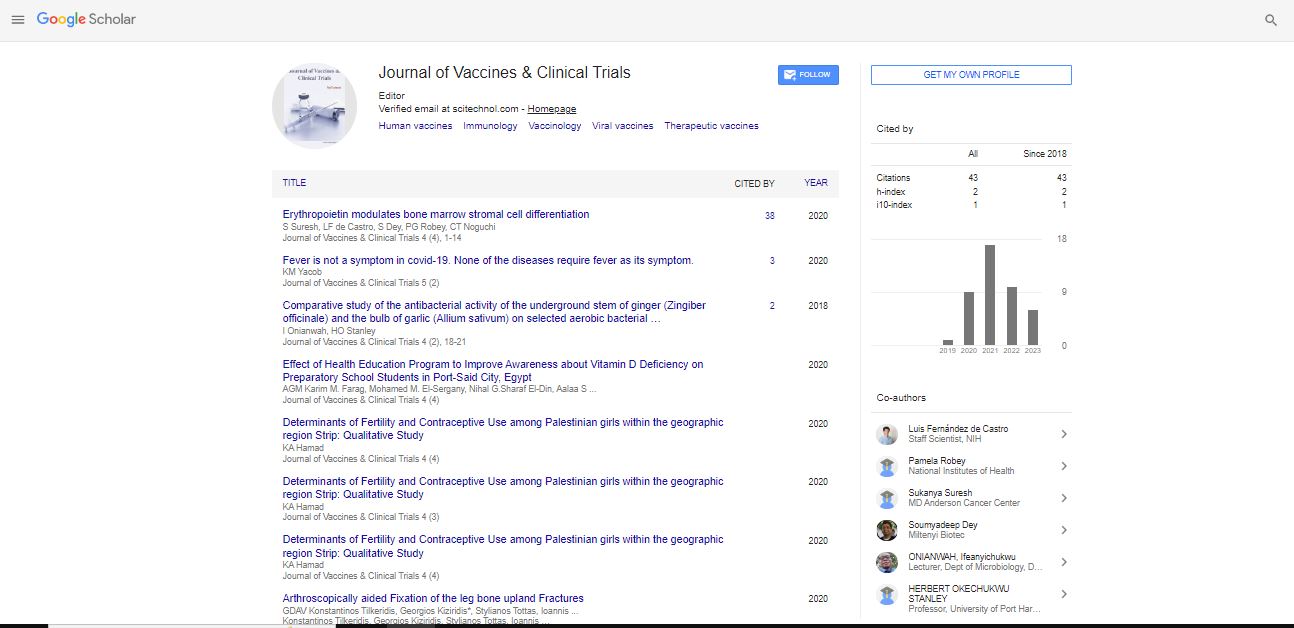Opinion Article, Jou Of Vac Cli Tr Vol: 7 Issue: 4
Epidemiology and Impact of Malaria: Challenges in Control and Prevention
Patrick Kitoga*
1Department of Epidemiology, Johns Hopkins University, Baltimore, USA
*Corresponding Author: Patrick Kitoga,
Department of Epidemiology, Johns
Hopkins University, Baltimore, USA
E-mail: kitogapatrick@jhu.edu
Received date: 27 November, 2023, Manuscript No. JVCT-24-128360;
Editor assigned date: 30 November, 2023, Pre QC No. JVCT-24-128360 (PQ);
Reviewed date: 07 December, 2023, QC No. JVCT-24-128360;
Revised date: 21 December, 2023, Manuscript No. JVCT-24-128360 (R);
Published date: 28 December, 2023 DOI: 10.4172/JVCT.100090
Citation: Kitoga P (2023) Epidemiology and Impact of Malaria: Challenges in Control and Prevention. Jou of Vac Cli Tr 7:4.
Description
Malaria, a disease with a long history entwined with humanity, continues to pose significant challenges to public health globally. Its impact spans across continents, affecting millions of lives each year. From its historical significance to the modern-day challenges and advancements in its prevention and treatment, the complex tale of malaria is multifaceted and continues to evolve.
Despite advancements in medical science, malaria remains a significant global health challenge. The disease, caused by Plasmodium parasites transmitted through the bite of infected female Anopheles mosquitoes, disproportionately affects tropical and subtropical regions, particularly in Africa. Sub-Saharan Africa accounts for a majority of malaria cases and deaths worldwide, with vulnerable populations such as children under five and pregnant women being at higher risk.
The World Health Organization (WHO) estimated that in 2020, there were approximately 229 million cases of malaria globally, with 409,000 deaths, mostly among children under five. The socioeconomic burden of malaria is immense, causing substantial healthcare costs, lost productivity, and hindering economic development in affected areas.
Malaria control faces multifaceted challenges, including drug resistance, insecticide resistance in mosquitoes, limited access to healthcare, and inadequate resources in endemic regions. The emergence and spread of drug-resistant malaria parasites, particularly in Southeast Asia, pose a grave threat to current treatment strategies, such as Artemisinin-based Combination Therapies (ACTs).
Furthermore, vector control methods, such as insecticide-treated bed nets and indoor residual spraying, though effective, encounter challenges due to mosquito resistance to commonly used insecticides. Climate change also influences the geographical distribution of malaria by altering the habitats of mosquitoes and the prevalence of the disease.
The battle against malaria has seen significant progress in recent decades. Research efforts have focused on developing new antimalarial drugs, vaccines, and innovative vector control methods. Artemisinin-based Combination Therapies (ACTs) have been a cornerstone of malaria treatment, but ongoing research aims to discover alternative drugs to combat resistance.
Additionally, the development of the RTS,S/AS01 malaria vaccine, also known as Mosquirix, marks a milestone in malaria prevention. While its efficacy is moderate and requires further enhancement, the vaccine represents a promising tool in the fight against malaria, especially for young children in endemic regions.
Moreover, advancements in genetic modification techniques offer hope for controlling mosquito populations. Gene-drive technology, though in its infancy and accompanied by ethical considerations, shows potential in altering mosquito populations to reduce their ability to transmit malaria parasites.
International efforts spearheaded by organizations like the WHO, the Global Fund to Fight AIDS, Tuberculosis, and Malaria, and various governmental and non-governmental organizations have aimed to reduce the burden of malaria. These initiatives focus on improving access to diagnostics, treatment, and prevention tools, as well as fostering research and development for new interventions.
 Spanish
Spanish  Chinese
Chinese  Russian
Russian  German
German  French
French  Japanese
Japanese  Portuguese
Portuguese  Hindi
Hindi 